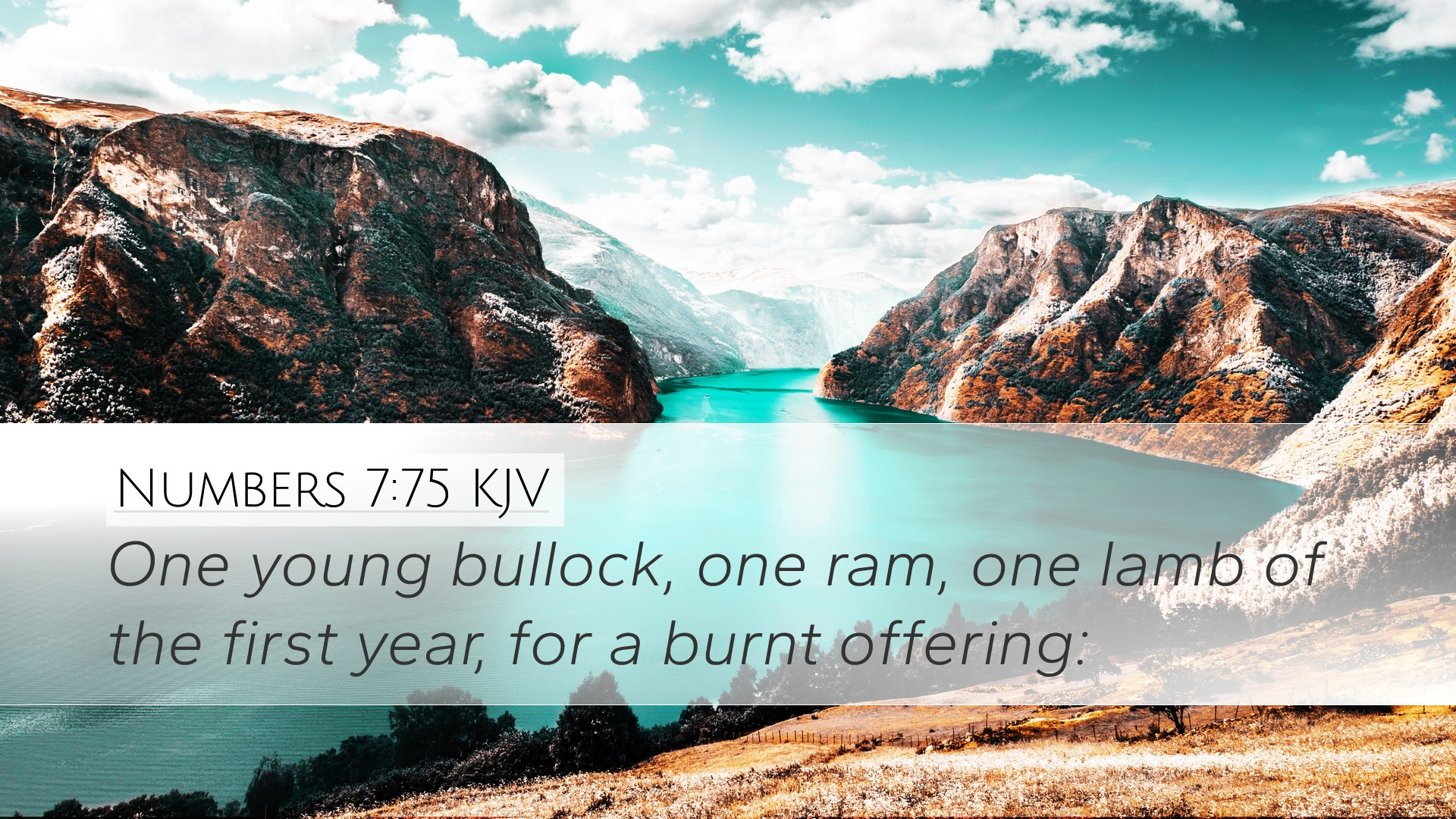Commentary on Numbers 7:75
Numbers 7:75 states: "One ladle of ten shekels of gold, full of incense." This passage is nestled within a larger narrative where the leaders of Israel present offerings during the dedication of the altar. The verse captures the essence of spiritual devotion and the significance of offerings in the worship of God.
Contextual Overview
The Book of Numbers details the journey of the Israelites from Sinai towards the Promised Land. Chapter 7 is particularly focused on the offerings made during the dedication of the altar. Each tribe's leader contributed, showcasing their unity and dedication to God. This event emphasizes not only the collective responsibility of the leaders but also individual contributions in the service of God.
Insights from Public Domain Commentaries
Matthew Henry's Commentary
Offerings as an Expression of Faith: Matthew Henry emphasizes that these specific offerings are reflective of the leaders’ commitment to God. The ladle of gold filled with incense symbolizes a sweet aroma rising to God, representing prayer and worship. Henry notes that such offerings are signs of honor given to God, demonstrating the reverence the leaders had towards the divine presence.
The Symbol of Incense: Incense, in biblical terms, represents both prayer and the presence of God. Each offering, illustrated by the ladle full of incense, signifies the offering of prayers that are pleasing to God. In the priestly traditions, the burning of incense was a critical element in the worship process. It serves as a metaphor for the heart’s desire to connect with God through sincere prayer.
Albert Barnes' Notes
Weight and Significance: Albert Barnes provides insight into the meaningfulness of the ten shekels of gold mentioned in the text. The weight is not merely numerical but also symbolic. Barnes describes the monetary offering as a representation of the physical manifestation of their faith and obedience. It suggests a balance between material wealth and spiritual commitment.
Collective Responsibility: Barnes highlights the cooperation of the tribes during this offering. The leaders are portrayed as representatives of their people, showing that worship is not an isolated act but a collective endeavor. The unity of effort is crucial, underscoring the importance of community in the practice of faith.
Adam Clarke's Commentary
Cultural Context: Adam Clarke places emphasis on understanding the cultural practices surrounding offerings in ancient Israel. He notes that the use of gold, especially in the context of worship, indicated a high value placed on the act of giving. Clarke elaborates that the leaders were motivated by a sense of duty and reverence, highlighting the importance of accountability in spiritual practices.
Symbolism of the Ladle: Clarke delves into the significance of the ladle itself, which could signify the spiritual nourishment one provides to God through their offerings. The ladle, a vessel for incense, represents the readiness to present something of value to God, portraying a heart of service and dedication.
Theological Reflections
This verse, along with the broader chapter, prompts several theological reflections for pastors, students, and scholars:
- The Nature of Giving: True giving comes from the heart. When leaders give, it sets an example for their followers, emphasizing that giving is an intrinsic part of worship and community.
- Offering as Prayer: The symbolism of incense as prayer challenges believers to consider how they present their prayers to God. Are our prayers sweet aromas, pleasing to Him?
- Community in Worship: The corporate nature of the Israelites’ offerings reminds modern congregations of the power of collective worship and shared responsibility in advancing God’s work.
- Sacredness of Vows: The leaders’ dedication of their offerings also reflects the sacred nature of vows made to God, stressing the importance of fulfilling spiritual commitments.
- Material vs. Spiritual: There is a balance to be struck between our material contributions and spiritual devotion—both are necessary to live out a faithful Christian life.
Conclusion
Numbers 7:75 embodies a profound moment of spiritual significance within the journey of the Israelites. It speaks to the heart of worship, the meaning of offerings, and the importance of communal faith. The interpretation from public domain commentaries reaffirms that true worship goes beyond the act of giving; it is a reflection of one's relationship with God, characterized by reverence, unity, and genuine intentions.
As the body of Christ continues to navigate through modern challenges, reflecting on these ancient practices and their meanings may enrich our worship and deepen our understanding of God’s expectations from us in our contemporary context.


